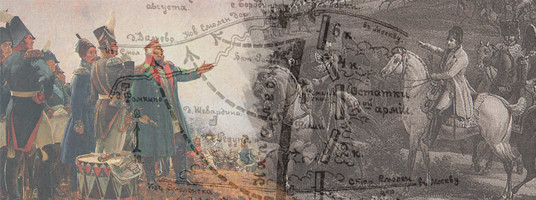Patriotic War of 1812

The 200th anniversary of one of the most momentous events of the Russian history – the Patriotic War of 1812 - was celebrated in 2012. “The 1812 Thunder” left a deep imprint on the memories of contemporaries and descendants, affecting all spheres of life of our country. Alexander Herzen once highlighted “it is the year of 1812 that genuinely reveals the real Russian history; everything before that was just a preface.” The collection that commemorates the event comprises a wide variety of materials which spotlight the history of the Patriotic War of 1812 in all its diversity.
Deep Russian-French contradictions, including Russia's refusal to support the continental blockade of Britain, had become the main reasons for the war. On June 10 (22), the French Ambassador sent a note on the severance of diplomatic ties between the countries and the beginning of the war. On June 12 (24), the Napoleonic army invaded Russia.
At the first stage of the war, which lasted from June to September 1812, the Russian army was forced to retreat inside Russia. The key event of this period was the Battle of Borodino on August 26 (September 7).
The Patriotic War became truly national in scope. The heroism of the Russian army, partisan detachments and militia, brilliant generalship of the Russian command contributed to the turning point of the war and ensured future victory. At the second stage, which covered the period from October to December 1812, the French army was defeated by the Russian army and forced to leave Russia, while military actions were moved to the territory of European states.
The collection features studies, official and archival documents, maps, visual and multimedia materials from the Presidential Library’s electronic holdings. In the spotlight are memoirs and official papers which read about the participation of the people in the defense of the Fatherland. It was specially for the collection that portraits of the heroes of the war of 1812 provided by the State Hermitage were digitized to become a part of the Presidential Library’s electronic holdings.
The collection has been built up of over 800 items, which are placed in thematic sections and feature brief annotations. Access to the whole collection is available in the Electronic Reading Room, while some of the documents can be accessed via the library's website.
The work over the collection involved a variety of materials on loan from the Foreign Policy Archive of the Ministry of Foreign Affairs of Russia, the US Library of Congress, the Library for Natural Sciences of the Russian Academy of Sciences, the M. Gorky Vladimir Regional Research Library, the M. Gorky Volgograd Regional Research Library, the A. Pushkin State Historical and Literary Museum-Reserve, the State Hermitage Museum, the State Public Historical Library, the “National Film Center” Film Studio, the Ministry of Culture of Moscow Region, the N. Krupskaya Moscow Regional State Research Library, the Kremlin Research Library, the A. Pushkin Omsk State Regional Research Library, the Russian State Library, the National Library of Russia, the Russian State Film and Photo Archive, the Russian State Historical Archive, the Herzen Russian State Pedagogical University, the M. Gorky Ryazan Regional Research Library, the St. Petersburg State University, the St. Petersburg State Theater Library, the Center for Information Technologies and Systems of Executive Bodies, the Federal Guard Service of Russia.
- Russia and France in the first quarter of the 19th century
- Foreign campaigns of the Russian army in 1813-1814 and 1815. Congress of Vienna
- Memory of the war of 1812

